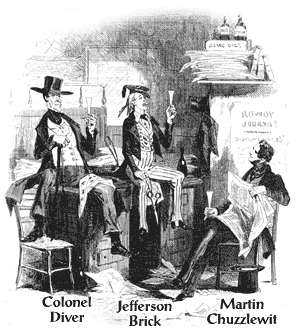For example, one of my intial complaints about Martin Chuzzlewit is how utterly meandering the plot is. There are two Martin Chuzzlewits in this book, Sr. and his grandson Jr. Martin Chuzzlewit Sr. has his companion Mary, a young orphan he has raised with the knowledge that she gets nothing of his fortune when he dies, so her wellbeing depends on his health. Martin Chuzzlewit Jr. has proposed to Mary and has been accepted, but they are forced apart by Sr's ire at the match. You would think this is what the story would revolve around, but we're not done yet. There's also Mr. Pecksniff, a self-decieving rogue, and his two daughters Charity and Mercy, and his apprentice Tom Pinch, who sees Pecksniff as nothing short of an angel, though the rest of the world begs to differ. Charity is romanced by Jonas Chuzzlewit, son of Anthony Chuzzlewit, brother of Martin Chuzzlewit Sr, but is jilted when he instead proposes to Mercy, who accepts him and proceeds to become very miserable in her choice. Now, two storylines would be fine, but it splits yet again to feature random characters that make little impression on the memory, and whose chapters do nothing but bore me. I'm not even sure who the main character(s) are supposed to be anymore.
The illustrations are pretty hilarious though.
"I say, look at these bitch-ass Americans. Bunch of loony todgers." - Martin
Now, all of that makes sense when I find out that this book was originally serialized, with a few chapters released at a time. Discovering that, for example, the first few chapters (featuring primarily Pecksniff) received a lukewarm reception and Dickens completely upended his own plot to send Martin Chuzzlewit Jr. to America, affording him an opportunity to satirize a whole different country, suddenly makes the meandering plot make sense. It seems like Dickens doesn't know where he's going because he actually doesn't know where he's going. It's frustrating, because today this is a big No No of the literary world. Even if you're writing to discover the story, you damn well better have found it before you publish.
And no, paragraph upon paragraph of metaphor/aphorism/philosophy-as-description doesn't count as story. I skipped a lot of those pages.
In fact, despite Dickens being generally regarded as among the 'classics', I think this is what really damns this whole book for me. It's just feels sloppy. In addition, the huge number of characters--most of which we just don't care about, I mean who is Mr. Bailey anyway?--make it feel bloated and inelegant. Brevity was certainly not honored in Dickens' time. There are cases where I think a large number of major characters can be pulled off successfully--I think George R. R. Martin's Song of Ice and Fire series does this well, though I have read others find the number of characters to be daunting, so that one may be more a personal opinion than anything.
For all that, Dickens does write well. Even when I don't care for what he's writing, the way he's turning phrases is what remains timeless in these books. (And there are other Dickens works I enjoy, honest: Bleak House, Little Dorrit and A Tale of Two Cities were all just fine, if suffering from some degree of the same issues, and also made excellent BBC adaptations.)
"Beside her sat her spinster daughters, three in number, and of gentlemanly deportment, who had so mortified themselves with tight stays, that their tempers were reduced to something less than their waists, and sharp lacing was expressed in their very noses."
"He was up before dayberak, and came upon the Park with the morning, which was clad in the least engaging of the three hundred and sixty-five dresses in the wardrobe of the year."And besides, you know what? It was free. God bless books out of copyright for those with empty pockets. And it taught me a very important lesson I've been struggling with for years (and probably will struggle with for years to come): it is okay to stop reading a book you don't like. Really. No book police is going to come arrest you. If it's holding up all your other reading and getting a chapter out is like pulling teeth, call it a wash and let it go. It's not a failure. There are just too many fantastic books in the world to waste time reading one that doesn't work for you.
Overall: 2 stars
Amazon: Martin Chuzzlewit (free!)
Other free e-book versions available at Project Gutenberg, Google Play and more.
More reviews: Martin Chuzzlewit on Librarything (Average 3.84 stars)
Martin Chuzzlewit on Goodreads (Average 3.81 stars)


No comments:
Post a Comment